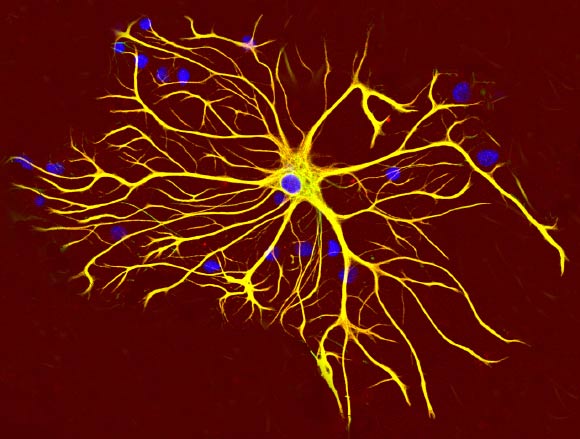Glial cells – non-neuronal brain cells that provide structural, nutritional and other supports to the brain — play a critical role in controlling appetite and feeding behavior, a new study in mice shows.
The study authors, led by Dr. Guoping Feng of MIT and Dr. Weiping Han of the Singapore Bioimaging Consortium, found that activating glial cells stimulates overeating, and that when the cells are suppressed, appetite is also suppressed.
“In the last few years, abnormal glial cell activities have been strongly implicated in neurodegenerative disorders,” Dr. Feng said.
“There is more and more evidence to point to the importance of glial cells in modulating neuronal function and in mediating brain disorders.”
According to neuroscientists, neurons in a brain area called hypothalamus control how much an animal eats.
However, it is not clear what role other brain cells, such as glial cells, might play in influencing feeding. Glial cells do not send nerve impulses like neurons, but instead they mostly serve to support and protect the neurons.
Dr. Feng, Dr. Han and their collaborators changed the activity of astrocytes — star-shaped glial cells that are predominant in the brain — to explore what effect this has on how much mice eat.
“Astrocytes are unique amongst glial cells because they can respond to neuronal activity and release chemicals that change the activity of other cells, including neurons,” the scientists explained.
The study revealed that switching astrocytes on in the hypothalamus made mice eat more, while turning them off had the opposite effect and reduced feeding.
The authors found that astrocytes partner with and change the activity of a particular group of neurons, known as AgRP neurons. Surprisingly, they also found that these cells do not affect the activity of another group of neurons, known as POMC neurons.
Previous research had shown that mice eat less when their POMC-neurons are more active. AgRP neurons were already known to stimulate feeding when they become more active.
Still unknown is how astrocytes exert their effects on neurons. Some recent studies have suggested that glial cells can secrete chemical messengers such as glutamate and ATP; if so, these ‘gliotransmitters’ could influence neuron activity.
Another idea is that instead of secreting chemicals, astrocytes exert their effects by controlling the uptake of neurotransmitters from the space surrounding neurons, thereby affecting neuron activity indirectly.
The team’s findings, published in the journal eLife this month, open the possibility of developing drugs to help treat obesity and other appetite-related disorders.
“We really know very little about how astrocytes contribute to the modulation of appetite, eating, and metabolism,” Dr. Feng noted.
“Our team now plans to develop new tools that could help scientists learn more about astrocyte-neuron interactions and how astrocytes contribute to modulation of appetite and feeding.”
_____
Naiyan Chen et al. 2016. Direct modulation of GFAP-expressing glia in the arcuate nucleus bi-directionally regulates feeding. eLife 5: e18716; doi: 10.7554/eLife.18716








